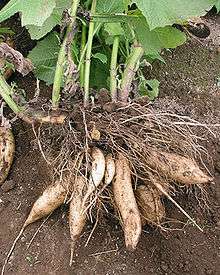Yacón syrup

Yacón syrup is a sweetening agent extracted from the tuberous roots of the yacón plant (Smallanthus sonchifolius) indigenous to the Andes mountains.[1]
It was used by the Incas. In Peru, people eat yacón because of its nutritional properties—few calories and low sugar levels. In Bolivia, yacón roots are eaten by people with diabetes or other digestive and renal disorders. In Brazil, the dried leaves are used to make yacón tea, said to be antidiabetic.[2]
The syrup contains up to 50% of fructooligosaccharides (FOS). The consumption of FOS does not increase blood glucose; however, the root consists of primarily free fructose at about 35%.[3]
It is usually made with an evaporator, like the ones used to make maple syrup.[1] It has a taste similar to molasses or caramelized sugar.[4] In a study by Yoshida et al. (2002), an enzyme solution of yacón was determined to be a better antioxidant than enzyme solutions of potato, mushroom, eggplant and edible burdock.[5]
In a study by Genta et al., it was shown that a daily intake of yacón syrup produced a significant decrease in body weight, waist circumference and body mass index when given to obese pre-menopausal women.[6]
References
- 1 2 Manrique, I.; A. Párraga; M. Hermann (2005). "Yacon syrup: Principles and processing" (PDF). Series: Conservación y uso de la biodiversidad de raíces y tubérculos andinos: Una década de investigación para el desarrollo (1993-2003). 8B: 31p. Retrieved 2008-04-27.
- ↑ Aybar, Manuel J.; Sánchez Riera, Alicia N.; Grau, Alfredo; Sánchez, Sara S. (February 2001). "Hypoglycemic effect of the water extract of Smallantus sonchifolius (yacon) leaves in normal and diabetic rats". Journal of Ethnopharmacology. 74 (2): 125–132. doi:10.1016/S0378-8741(00)00351-2. PMID 11167030. Retrieved 2008-04-27.
- ↑ Lachman, J.; E.C. Fernández; M. Orsák (2003). "Yacon [Smallanthus sonchifolia (Poepp. et Endl.) H. Robinson] chemical composition and use – a review" (PDF). Plant Soil Environ. 49 (6): 283–290. Retrieved 2008-06-16.
- ↑ Engelhart, Terces; Orchid (2007). I Am Grateful: Recipes and Lifestyle of Cafe Gratitude. North Atlantic Books. p. 241. ISBN 1-55643-647-5. Retrieved 2008-06-16.
- ↑ Lachman, J.; E.C. Fernández; M. Orsák (2003). "Yacon [Smallanthus sonchifolia (Poepp. et Endl.) H. Robinson] chemical composition and use – a review" (PDF). Plant Soil Environ. 49 (6): 283–290. Retrieved 2008-06-16.
- ↑ Genta, Susana; Wilfredo Cabrera; Natalia Habib; Juan Pons; Ivan Manrique Carillo; Alfredo Grau; Sara Sanchez (2009). "Yacon syrup: beneficial effects on obesity and insulin resistance in humans". Clinical Nutrition. 28 (2): 182–7. doi:10.1016/j.clnu.2009.01.013. PMID 19254816. Retrieved 24 November 2012.